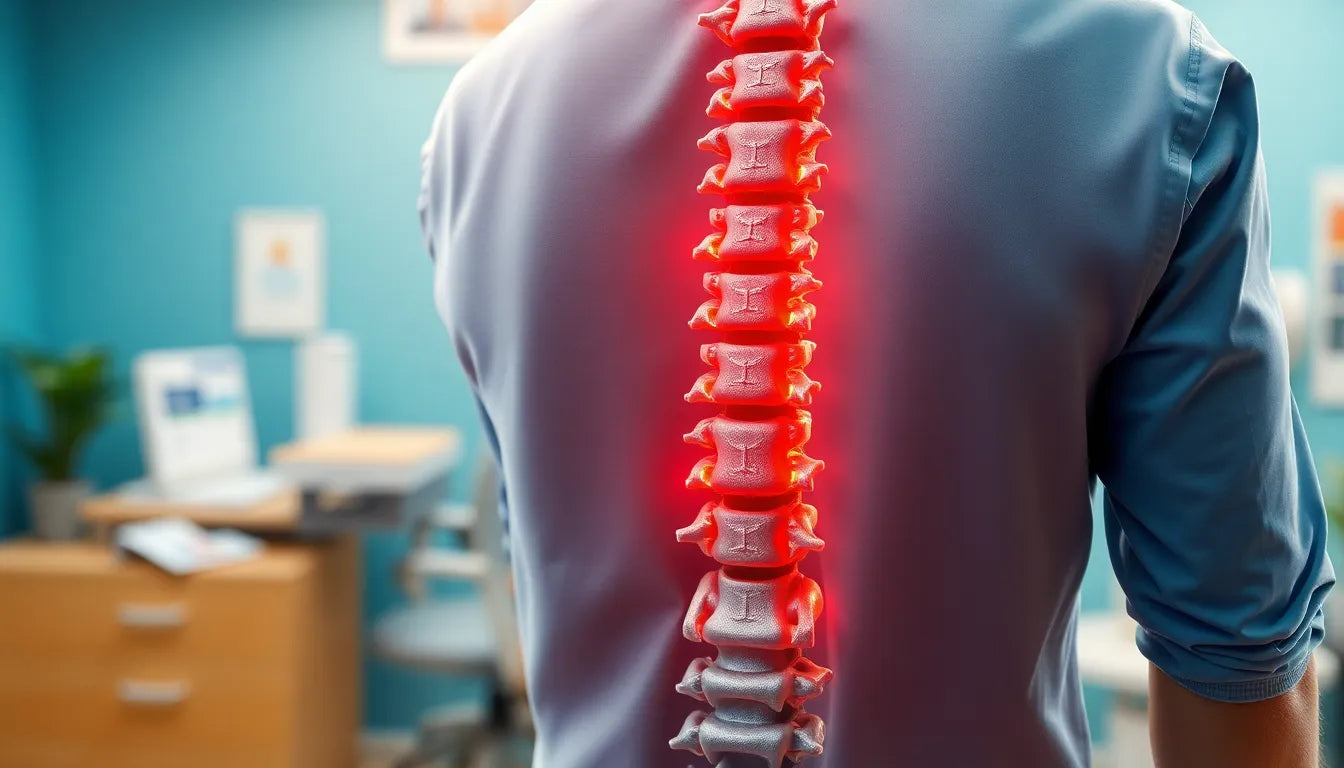A herniated disc, often referred to as a slipped or ruptured disc, occurs when the soft inner gel of a spinal disc pushes through a crack in the tougher exterior casing. This condition can lead to significant discomfort and impact daily life, as it often results in symptoms such as back pain, sciatica, and muscle weakness. These symptoms can vary in intensity, but they frequently interfere with routine activities, making effective management crucial.
how painkillers play a role in managing herniated disc pain
Painkillers are commonly used to manage the discomfort associated with herniated discs. They provide relief by targeting pain and, in some cases, inflammation, which is an underlying factor in many cases of herniated disc pain. Understanding the types of painkillers available and their appropriate use is essential for effective pain management. This includes over-the-counter options like nonsteroidal anti-inflammatory drugs (NSAIDs) and acetaminophen, as well as prescription medications for more severe pain.
purpose of exploring herniated disc painkillers
The aim of this blog post is to provide a comprehensive guide on the various painkiller options available for managing herniated disc pain. By exploring the benefits, limitations, and potential risks of different medications, we intend to equip you with the knowledge needed to make informed decisions about your pain management strategy. It is crucial to recognize that while painkillers can offer relief, they do not cure the underlying condition. Therefore, understanding their role within a broader treatment plan is vital.
first-line painkillers: the role of NSAIDs
Nonsteroidal anti-inflammatory drugs (NSAIDs) such as ibuprofen and naproxen are frequently recommended as the first line of defense against herniated disc pain. These over-the-counter medications are popular due to their dual action of relieving pain and reducing inflammation, which is often a significant contributor to discomfort in herniated disc cases.
NSAIDs work by inhibiting enzymes responsible for inflammation, thereby alleviating pain and swelling. However, it's crucial to be aware of their limitations and potential risks. Long-term or excessive use of NSAIDs can lead to gastrointestinal issues, including ulcers and bleeding. Additionally, they may pose cardiovascular risks and affect kidney function, especially in individuals with pre-existing conditions. Therefore, it is advisable to use NSAIDs under the guidance of a healthcare professional, particularly for prolonged treatment.
alternative over-the-counter options: acetaminophen
Acetaminophen, commonly known by the brand name Tylenol, serves as another over-the-counter option for managing herniated disc pain. Unlike NSAIDs, acetaminophen does not possess anti-inflammatory properties, making it less effective in addressing inflammation-related discomfort. However, it can be a suitable choice for individuals who cannot tolerate NSAIDs due to gastrointestinal or cardiovascular concerns.
Acetaminophen primarily targets pain relief and is generally considered safe when used as directed. Nevertheless, it is essential to adhere to recommended dosages, as excessive intake can lead to liver damage. In situations where inflammation is not a predominant factor, acetaminophen may be a preferred option for managing pain.
prescription medications for severe cases
In cases where over-the-counter medications fail to provide adequate relief, prescription medications may be necessary. Opioids, for instance, are potent painkillers reserved for short-term use in severe pain scenarios. While effective, they carry a high risk of addiction and other side effects, making them a less favorable option for long-term management.
Muscle relaxants are sometimes prescribed to alleviate muscle spasms associated with herniated discs. However, recent studies have raised questions about their effectiveness. Additionally, these medications can cause sedation and other side effects, necessitating cautious use.
Nerve pain medications, such as gabapentin and certain antidepressants, are employed to target neuropathic pain, which can occur in cases involving nerve compression, like sciatica. These medications work by altering nerve signals to reduce pain perception. While they can be beneficial, they may also cause drowsiness and require careful monitoring.
topical analgesics and anticonvulsants for targeted relief
For localized pain relief, topical analgesics, available in the form of creams or patches, can offer an effective solution with minimal systemic side effects. These treatments are particularly useful for mild, localized pain and can be used in conjunction with other therapies.
Anticonvulsants, such as gabapentin and pregabalin, are sometimes utilized for nerve pain associated with herniated discs, especially in cases of sciatica. By modulating nerve activity, they help alleviate pain, although they may cause side effects such as dizziness and fatigue.
ensuring safe and effective use of painkillers
When managing herniated disc pain, it is crucial to prioritize safety and consult healthcare providers for persistent or severe pain. Long-term use of certain medications, particularly NSAIDs and opioids, should be approached with caution due to potential risks. A comprehensive pain management plan often involves a combination of pharmaceutical and non-pharmaceutical approaches, including physical therapy and ergonomic aids, to enhance recovery and reduce reliance on medication.
comparing painkiller options for herniated disc pain
When it comes to managing herniated disc pain, understanding the various painkiller options is crucial. Here's a comparative summary to help identify the most suitable choice based on individual needs and medical advice:
| Medication Type | Examples | Key Benefit | Limitation / Risk | Best For |
|---|---|---|---|---|
| NSAIDs | Ibuprofen, naproxen | Reduce pain/inflammation | GI, heart, kidney risks | First-line for most |
| Acetaminophen | Tylenol | Pain relief | No effect on inflammation | When NSAIDs not possible |
| Opioids (Rx only) | Oxycodone, codeine | Severe pain | Addiction, short-term only | Refractory severe pain |
| Muscle Relaxants (Rx) | Cyclobenzaprine | Spasm relief | Sedation, questionable efficacy | Muscle spasms |
| Nerve Pain Meds | Gabapentin, duloxetine | Nerve/sciatica pain | Drowsiness, off-label in some cases | Nerve-related pain |
| Topical Analgesics | Creams/patches | Local pain relief | Mild, short-term effect | Mild, localized pain |
| Anticonvulsants | Gabapentin, pregabalin | Nerve/sciatica pain | Drowsiness, side effects | Sciatica/nerve pain |
conclusion: finding the right approach
Choosing the appropriate painkiller for herniated disc pain involves considering both the benefits and risks associated with each option. NSAIDs are typically recommended as the first line of treatment due to their ability to address both pain and inflammation. However, for those who cannot tolerate NSAIDs, acetaminophen offers an alternative for pain relief, albeit without anti-inflammatory effects.
In more severe cases, prescription medications such as opioids, muscle relaxants, or nerve pain medications may be necessary. It is essential to use these under strict medical supervision due to their potential side effects and risks. Additionally, topical analgesics and anticonvulsants can provide targeted relief, especially in cases involving nerve pain.
Ultimately, managing herniated disc pain effectively requires a comprehensive approach, often combining medication with supplementary therapies like physical therapy and ergonomic adjustments. Consulting with healthcare professionals is vital to tailor a plan that addresses individual needs and minimizes risks.
frequently asked questions
What are the most effective painkillers for herniated disc pain?
NSAIDs are generally recommended first due to their dual action of pain relief and inflammation reduction. However, effectiveness can vary based on individual circumstances and medical history.
Can I use acetaminophen for herniated disc pain?
Yes, acetaminophen can be used for pain relief, particularly if NSAIDs are not tolerated. However, it does not reduce inflammation, which may limit its effectiveness in certain cases.
Are there risks associated with long-term use of painkillers?
Yes, long-term use of painkillers, especially NSAIDs and opioids, can lead to significant side effects, including gastrointestinal issues, cardiovascular risks, and addiction. Medical supervision is advised for prolonged use.
What should I do if over-the-counter medications are not effective?
If over-the-counter medications do not provide sufficient relief, it is important to consult a healthcare provider. They may recommend prescription options or additional therapies to address the pain effectively.
Are there non-drug treatments available for herniated disc pain?
Yes, non-drug treatments such as physical therapy, ergonomic aids, and lifestyle modifications can complement medication and help manage herniated disc pain more effectively.
Sources
- Medical News Today. "Herniated Disc Pain Relief."
- WebMD. "Pain Relief for a Herniated Disc."
- Mayo Clinic. "Herniated Disk: Diagnosis and Treatment."
- Axion Spine & Neurosurgery. "Herniated Disc Treatment Options."
- ProHealth Clinic. "Managing Herniated Disc Pain."
- Performance Pain. "Top 5 Painkillers for Herniated Disc Pain."
- Sciatica.com. "Herniated Disc Pain Medication Options."
























